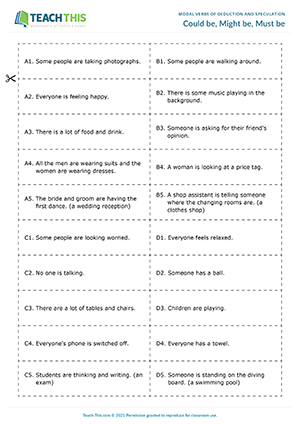

His number was busy all night - he _ been on the phone continuously for hours.I don't know where they went on holiday but they bought Euros before they left so they _ gone to France or Germany.You _ been ill - Don said you were at the ice hockey match last night. Don't lie to me that you were ill yesterday.I can't believe Jim hasn't arrived yet.I didn't know you were going to Phil's party yesterday.She _ passed her driving test this morning. Sarah looks really pleased with herself.Nobody answered the phone at the clinic.Must have - Might have - Could have - May have - Should have - Can't have Past Modals of DeductionĬhoose one of the following to complete the sentences. Note that these verbs, like all modal verbs, are followed by an infinitive without to.ĭo this exercise to test your grammar again.Advanced Level > Grammar Worksheets > Practice of past modal verbs used to make deductions such as "must have", "can't have" and "might have". It can't be easy for him, looking after three kids on his own. We use can't when we feel sure that something is not possible. They all have the same meaning, but may is more formal than might and could. We regret to inform you that some services may be delayed due to the bad weather. We use might, may or could to say that we think something is possible but we're not sure. You must be freezing out there! might, may, could He must live near here because he always walks to work.Ĭome inside and get warm. We use must when we feel sure that something is true or it's the only realistic possibility. This page focuses on making deductions about the present or future. students to learn how to use modal verbs of deduction and speculation in the present and in the past. The modal verb we choose shows how certain we are about the possibility. A selection of English ESL deduction printables. We can use modal verbs for deduction – guessing if something is true using the available information. Modals – deduction (present): Grammar test 1 You can't be bored already! You've only been here five minutes. They might be at work or they could be in the car. Look at these examples to see how must, might, may, could and can't can be used.


 0 kommentar(er)
0 kommentar(er)
